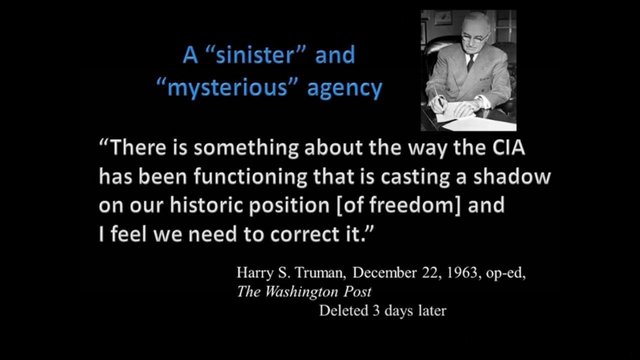Fake news and the CIA

Don't believe what you hear
Don't believe what you see
If you just close your eyes
You can feel the enemy --U2
For all its pretense of freedom, corporate and even government interests have unduly influenced western media for a long time. Sometimes they knowingly cooperated.[1] In America, this co-operation intensified thanks to Frank Wisner, who in 1948 began the Office of Policy Coordination at the CIA. Wisner held that the International Organization of Journalists was a Soviet-funded Communist organization that needed to be countered. Under Operation Mockingbird,[2] he recruited Washington Post publisher, Phil Graham, to co-ordinate media co-operation with the CIA in the name of patriotism. The CIA would give stories to co-operating or unwitting reporters, and participating reporters and wire services would repeat the story, turning influential American media into spy agency echo-chambers.
Investigations in the wake of Watergate proved this to a disturbing extent. Carl Bernstein, who himself won a Pullitzer Prize in 1973 for his Watergate coverage, recounts this in his 1977 Rolling Stone article, “CIA and the Media.”[3] Bernstein says that files on more than 400 journalists who had worked with or for the CIA were given to the Senate Intelligence Committee led by Frank Church. Bernstein said CIA officials would be embarrassed at the full revelation of their relationships with the most powerful organizations and individuals in American journalism during the 1950s and 1960s which included “American Broadcasting Company, the National Broadcasting Company, the Associated Press, United Press International, Reuters, Hearst Newspapers, Scripps‑Howard, Newsweek magazine, the Mutual Broadcasting System, the Miami Herald and the old Saturday Evening Post and New York Herald‑Tribune,”[4] but the most important were with the New York Times, CBS, and Time.
The Watergate scandal brought public questions as to the extent that intelligence agencies were using reporters. This led to Senate Intelligence Committee hearings on the subject in 1975. CIA Director William Colby publicly told the committee,[5] “We do have people who submit pieces to American journals,” but refused to answer publicly whether the CIA had people contributing reports on television and in the news wire services. Bernstein tells us that upon taking over the CIA, Colby was disturbed at how extensively the CIA was using journalists, including “brand name” ones. Even so, the Church Committee decided against questioning any of the reporters, editors, publishers or broadcast executives the CIA was shown to have a relationship with. Bernstein recounts that the use of such people, along with academics, were two areas of the highest sensitivity for the CIA.
The result was that the relationship between the CIA and journalists was pushed back but never ended. When George Bush took over as head of the CIA in 1976, he announced, “Effective immediately, the CIA will not enter into any paid or contractual relationship with any full‑time or part‑time news correspondent accredited by any U.S. news service, newspaper, periodical, radio or television network or station.”[6] The CIA admitted they would still “welcome” voluntary co-operation and that this policy would only end half of the 50 journalists still connected with the agency. The reasons for this might have been revealed by the testimony one CIA official made to the Senate committee: “The files show that the CIA goes to the press for and just as often that the press comes to the CIA... There is a tacit agreement in many of these cases that there is going to be a quid pro quo.”[7] If a reporter did something for the CIA, they might get the inside scoop on the next story…or would that be the next government-agency disinformation?
Author and former CIA Counter Terrorism, Counterintelligence and Staff Investigator Kevin Shipp believes this quid pro quo continues. He sued the CIA in 2011 with accusations that the agency put him in a home full of mold that damaged the health of his family, leading to the loss of his marriage and career. The CIA used the state secrets act to have a judge seal the case and also highly redacted the documents that proved the truth of his claim. He went to the Washington Post with the story, they instead called the CIA to let them know Shipp was talking to them. It was only after the New York Times published their article on Shipp[8] on February 10, 2011 that the Washington Post followed up later that same day.[9] It is Shipp’s opinion that the Post’s unabated co-operation with the CIA is reflected by its recent $6 billion contract with Amazon, the current owners of the paper.[10]
We need alternative media. We need an internet bill of rights.
[1] “Kevin Shipp-Pt1- CIA Officer Exposes the Shadow Government,” Charles Ewing Smith (YouTube, March 5, 2018), https://youtu.be/zq0Yc2SwLnA?t=13m7s. [2] “Operation Mockingbird,” Wikipedia, accessed May 29, 2018, https://en.wikipedia.org/wiki/Operation_Mockingbird. [3] Carl Bernstein, “The CIA and the Media,” Rolling Stone (USA, October 20, 1977), http://www.carlbernstein.com/magazine_cia_and_media.php. [4] Ibid. [5] “Church Committee: CIA Manipulating News,” Non Mirage Truth Vision (YouTube, January 23, 2018), https://www.youtube.com/watch?v=sfGxQdc0Kg8. [6] Bernstein, “The CIA and the Media.” [7] Ibid. [8] Charlie Savage, “Ex-C.I.A. Agent Goes Public With Story of Mistreatment on the Job,” New York Times, February 10, 2011, https://www.nytimes.com/2011/02/11/us/politics/11secrets.html. [9] Jeff Stein, “Ex-CIA Staffer Alleges Agency Coverup in Toxin Exposure Case - The Washington Post,” Washington Post (Washington, D.C., February 10, 2011), https://www.washingtonpost.com/world/ex-cia-staffer-alleges-agency-coverup-of-toxin-exposure/2011/02/10/ABchOrQ_story.html [10] “Kevin Shipp-Pt1- CIA Officer Exposes the Shadow Government.” The quote begins at 47:48.